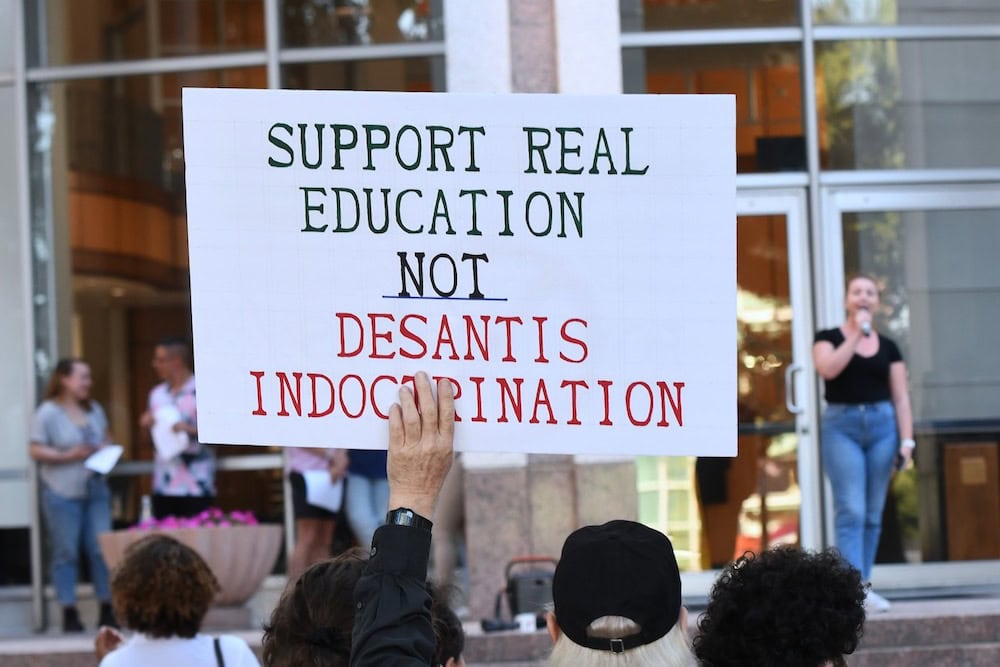The state's actions have created an environment of censorship and discrimination in classrooms that harms education for all Florida students but is especially hostile in its impact on Black Floridians and LGBTQ Floridians.
This statement was originally published on hrw.org on 19 June 2024.
People feel empowered to attack queer students because if the legislators can do it, they think they can do it too… I’ve heard slurs being said constantly and no teacher bats an eye and it’s like, whoa, why aren’t you doing anything about it? We need more protections for queer students. We need schools that are an inclusive space.
— Kara F., Sarasota Florida high school senior, March 2024
When the state says that you can teach slavery but not the bad parts, that’s a tremendous injury.
— Dr. Marvin Dunn, Miami Florida educator, February 2024
There’s an attack on Blackness here. Anti-Black policies and anti-LGBTQ policies. It’s bad, and it’s causing people to feel hopeless.
— Patricia T., Jacksonville Florida parent, February 2024
Since 2021, Florida has issued laws and policies that censor and distort the curriculum and educational environment of K-12 classrooms in ways inconsistent with international human rights standards on education, access to information, and discrimination. Florida’s policies have also led to the removal of information, instruction, and books from classrooms under procedures exploited by antagonistic political groups. The state’s actions have created an environment of censorship and discrimination in classrooms that harms education for all Florida students but is especially hostile in its impact on Black Floridians and LGBTQ Floridians. Led by Governor Ron DeSantis and the state’s Department of Education, such efforts also include promulgating new civics training for teachers and history standards for students, rejected as inaccurate or misleading by teachers, scholars, and Florida education professionals.
Florida’s efforts to censor undermine students’ ability to access accurate information, participate in age-appropriate discussions, develop critical thinking skills, and prepare to engage with a changing society. Proponents of Florida’s new laws claim they seek to reform divisive and inappropriate school curricula, but they themselves are imposing a curriculum riddled by harmful gaps and inaccurate information that reinforce discrimination, driven by politicians rather than education experts and professionals best suited to determine content that maximizes a child’s healthy development. Determining age appropriateness is not a new factor in building educational environments in schools, but now, the professional expertise of local educators and librarians is being challenged and supplanted by people without training in these topics. Meanwhile, students, parents, and educators are left to operate in a politicized environment rife with suppressed speech, stifled discussion, and corrosive fear that their legitimate demands for inclusivity and nondiscrimination will be met with reprisals. According to Florida students, parents, and teachers interviewed for this report, the legal and curriculum changes have created an educational environment more conducive to harassment and discrimination in the classroom on the basis of race, sexual orientation, and gender identity.
Florida’s discriminatory educational legal framework for K-12 schools is primarily built out of three laws. The first, known as the Stop WOKE Act (House Bill 7), prohibits instruction “embracing the concept that individuals share responsibility for others’ past actions due to their race, sex, or national origin.” State leaders have suggested that the law is necessary because curricula and classroom instruction about the history of racism and social inequality may represent discrimination against white students and make them uncomfortable. Our findings, however, show that the law has fueled censorship of information about Black history and curtailed meaningful and informed classroom discussions of racism.
The second, known as the “Don’t Say Gay or Trans” law (House Bill 1557), restricts any teaching between kindergarten and third grade about sexual orientation or gender identity as well as teaching about these topics in other grades unless it is deemed “age-appropriate,” a term that is undefined. This law deprives LGBTQ students of information they need to live safe and healthy lives and deters discussions of LGBTQ identities in public schools, while permitting discussion of and education about heterosexuality and non-LGBTQ identities.
The third law, House Bill 1069, extends the provisions of the “Don’t Say Gay or Trans” law by banning instruction on sexual orientation and gender identity from pre-kindergarten to eighth grade as well as teaching about these topics in high school unless it is deemed “age appropriate.” It also prohibits teachers from asking a student’s pronoun or name, or providing their own pronouns or names if they do not correspond to the teacher’s sex assigned at birth. The law significantly limits the ability of counselors and teachers to act as confidential resources for students, including LGBTQ students who may not feel comfortable discussing sexual orientation or gender identity with their family, or students for whom this could be dangerous. HB1069 also changed book challenge procedures, resulting in hundreds of books by LGBTQ and Black authors being removed from Florida’s library shelves. For example, “ABCs of Black History” a children’s book about important figures, places, and moments in Black history, and “And Tango Makes Three” a children’s book about two male penguins adopting an orphan penguin, among countless other books, have been challenged and, in some instances, removed.
Florida’s discriminatory educational censorship laws sparked numerous ongoing lawsuits, which challenged them on the grounds of being vague and overly broad, as well as for violating constitutional free speech and equal protection guarantees in the US Constitution. Federal courts blocked some provisions of the laws, with one judge issuing a temporary injunction of the Stop WOKE Act at the higher education level because it gave Florida “unfettered authority to muzzle its professors in the name of ‘freedom.’” And while a legal challenge to the Don’t Say Gay or Trans law has reached a settlement clarifying some language, the law remains in force and its discriminatory impact on elementary, middle, and high school curricula continues. The polarizing impact of the law as implemented before the settlement also continues.



